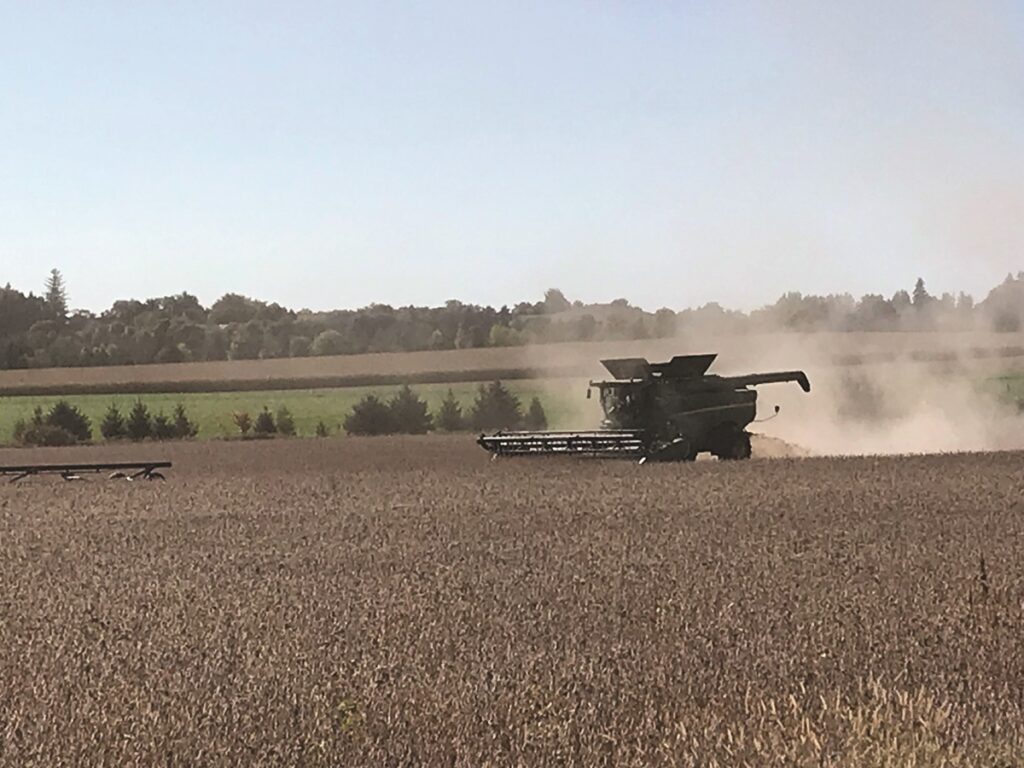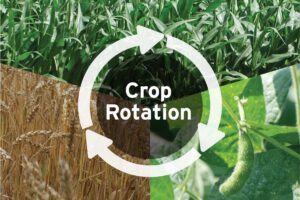Market access update
NEW GPS TRACEABILITY REQUIREMENTS

IN 2024 AND 2025, two critical markets for Ontario grains will be introducing new market access requirements.
CANADA’S CLEAN FUEL REGULATIONS
Biofuels are a critical market for Ontario corn, representing 33 per cent of end-use market utilization. Across North America, demand for low-carbon biofuels is expected to grow. Canada’s Clean Fuel Regulations (CFR) were introduced last year to help reduce the greenhouse gas emissions associated with transportation fuel produced and used in Canada. The CFR requires suppliers of liquid fossil fuels (gasoline and diesel) to gradually reduce the carbon intensity from the fuels they produce and sell for use in Canada over time. One way they can achieve this is through acquiring low-carbon biofuel credits. Credits can be generated and sold by biofuel companies, such as ethanol plants, which produce CFR-compliant biofuels with a lower carbon score than fossil fuels. They then sell them to fossil fuel companies, receiving value for biofuel and the carbon reduction credit.
To generate verifiable credits, biofuel producers must meet certain feedstock compliance requirements. Any agricultural feedstock harvested in 2024 and after must comply with the regulation’s land use and biodiversity (LUB) criteria and chain of custody requirements to confirm compliance. Grain Farmers of Ontario has advocated to the government that crops grown in Canada already meet strict environmental, plant, and wildlife protection standards through existing government legislation. As such, we proposed that they should be granted automatic aggregate compliance with the LUB criteria. As part of the regulation, the government established a framework for reviewing a region’s legislation against
the LUB criteria to allow for a streamlined compliance demonstration option. In November of 2023, the government confirmed that following its assessment, the protections provided by Canada’s existing legislation satisfied the LUB criteria. As a result, Canadian farmers will not be required to individually demonstrate feedstock compliance through administrative processes like certifications.
However, the regulations will require farmers to make a harvester declaration annually for audit purposes, confirming their regulatory exemption to the land use and biodiversity criteria. This will entail a statement verifying that the feedstocks were grown in Canada and are therefore compliant for use in the CFR since Canada has national legislative recognition. To meet chain of custody requirements, farmers will need to include GPS coordinates of their harvesting site when making that declaration (i.e., the longitude and latitude coordinates associated with their primary farm address). These declarations can be incorporated into a grain contract and would only be required once per year. Grain Farmers of Ontario is currently part of a value chain working group exploring a standardized approach to declaration language. Grain Farmers of Ontario aims to ensure that the
value chain can easily incorporate all the essential declaration components so that no feedstock falls out of compliance. Because this regulation is expected to drive market growth and value creation for Ontario biofuels, the value chain will likely seek to capture compliance declarations across most of the corn and soy supply so that any crops finding their way into biofuels can be compliant.
Grain Farmers of Ontario will provide more detailed information on declaration requirements for farmers as more information becomes available.
EU DEFORESTATION REGULATION
EU’S DEFINITION OF DEFORESTATION
The EU defines deforestation as the conversion of forest to agricultural use, whether human-induced or not, whether legal within the country or not. The EU defines a forest as land spanning more than 0.5 hectares (1.24 acres) with trees higher than five meters and a canopy cover of more than 10 per cent, or trees able to reach those thresholds in situ, excluding agricultural plantations (e.g., fruit orchards) and land that is predominantly under agricultural or urban land use.
The European Union (EU) has long been one of Canada’s largest and most stable markets for soybean exports. Over the past five years, on average, it has represented 17 per cent of Canada’s soy export value (approximately $500 million annually) and 18 per cent of Canada’s export volume (approximately 850,000 tonnes annually). However, new EU market regulations are leading to an increasingly complicated and costly trading environment. In 2023, the EU adopted a deforestation regulation (EUDR) that will prevent the EU market entry of soybeans and soy-based products produced on land deforested after December 31, 2020.
In 2023, the EU adopted a deforestation regulation (EUDR) to prevent the EU market entry of soybeans and soy-based products produced on land deforested after December 31, 2020.
While this regulation is responding to EU concerns about soy originating from countries with a high risk of deforestation, it is being applied broadly to all countries, regardless of their land-use change levels or the circumstances of conversion.
When compliance requirements enter into force in January 2025, EU soy importers will need to proactively conduct due diligence across a wide range of compliance obligations. The regulation text is highly prescriptive and will necessitate an unprecedented level of traceability and segregation within global value chains.
Compliance requires proactively ensuring products are deforestation-free, produced in accordance with relevant local laws, and accompanied by a due diligence statement. The due diligence statement confirms that a thorough assessment found no or negligible risk of deforestation. Most significantly, the regulation requires importers to report, for each shipment, the GPS coordinates of all non-adjoining plots of land where the relevant commodities were produced. This differs from the CFR GPS requirement, which only necessitates the longitude and latitude of the primary farm address to signify the crops were grown in Canada. The EUDR coordinate requirement was established so that the EU can use publicly available satellite images and positioning to check whether the land has been converted from forest to agricultural use since 2020.
WHAT WILL THESE NEW REGULATIONS MEAN FOR YOUR FARM IN 2024?
If your crops are sold into the Canadian biofuels market (e.g., ethanol), you may be asked to complete an annual harvest declaration for your grain customers so that your crops can be compliant with Canada’s Clean Fuel Regulations. This will include providing the GPS coordinates (longitude and latitude) associated with your primary farm address.
Starting in 2025 (including for crops harvested in 2024), only soybeans produced on land that has not been deforested since 2020 will be eligible for export to the EU. It is not yet clear how the value chain will facilitate compliance and verification of this, but declarations and the provision of field-specific GPS coordinates may be required for verification purposes.
Grain Farmers of Ontario and Soy Canada have been clear with the EU and Canadian governments that this level of traceability would introduce enormous complexity and cost to the commodity value chain, and have been engaging with the government and the value chain to explore opportunities to streamline compliance where possible to ensure that Canada can maintain EU market access for qualifying crops. Options for broad industry solutions to compliance may be limited, given the rigidity and specificity of the regulation. As pathways become clearer, Grain Farmers of Ontario and its partners will communicate with farmers on these data requirements.
Dana Dickerson is Grain Farmers of Ontario’s manager of market development and sustainability. •


























